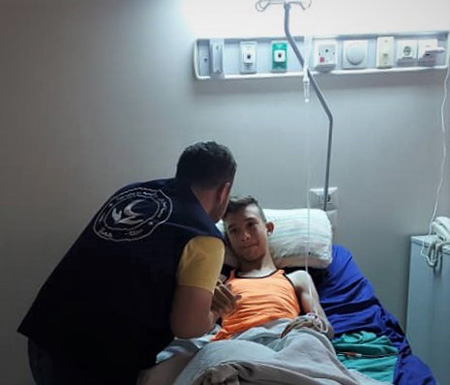 4 April 2023 ̶ Thanks to humanitarian funding of the European Union, 15-year-old Mohammad is once again a successful student with a dream to make a difference in the world by becoming a doctor who provides healthcare to those who need it most.
4 April 2023 ̶ Thanks to humanitarian funding of the European Union, 15-year-old Mohammad is once again a successful student with a dream to make a difference in the world by becoming a doctor who provides healthcare to those who need it most.
Most parents find their teenage boys to be a handful. In Salamiyah, however, an ancient Syrian town in Hama governorate, one set of parents would beg to differ: their son Mohammed was a curious, active, 15-year-old, with a passion for learning, driving his engagement as a high school student. That is, until the family was blindsided by a sharp pain in Mohammad’s feet that made walking increasingly difficult until he was forced to leave school. Already struggling to make ends meet due to severe socio-economic decline, Mohammad’s parents were as devastated by his sudden illness as by their lack of resources to provide their son with the medical care he urgently needed.
Desperately trying to find help, Mohammad’s parents approached the WHO-supported Al Bir and Al Ihsan NGOs where doctors performed his necessary surgery. After months of physical therapy sessions, Mohammad made a full recovery and was finally able to return to school. With the full support and encouragement of his family and teachers, Mohammad managed to catch up and get his education back on track.
“The enduring crisis in Syria has given rise to a complex and protracted humanitarian emergency, characterized by an estimated 15.3 million people in dire need of critical medical assistance. The disrupted health system is incapable of sufficiently catering to their requirements, owing to extensive devastation, insufficient resources, and inadequate healthcare access,” said Dr Iman Shankiti, WHO Representative a.i. in Syria. “We are grateful for the EU’s generous contributions for 10 years now. They have made a vital difference in tackling acute health gaps and further scaling up WHO’s efforts to reach every person in need across the country,” Dr Shankiti added.
Over the last decade, the EU’s humanitarian support of more than EURO $ 63 million has played a crucial role in strengthening WHO’s response to the crisis in Syria, enabling the provision of life-saving and life-sustaining assistance to the most vulnerable population, and ensuring that essential health services are maintained in the country. EU humanitarian support has been instrumental in improving the health outcomes of countless individuals affected by the ongoing conflict, including the next generation of children like Mohammad.


